Obesity and Sugary Beverage Consumption in Canada
VerifiedAdded on 2023/06/03
|7
|1522
|444
AI Summary
This report sheds light on the prevalence of obesity and excessive consumption of sugary beverages in Canada, along with the negative health implications. It also discusses possible recommendations to curb this emerging menace.
Contribute Materials
Your contribution can guide someone’s learning journey. Share your
documents today.
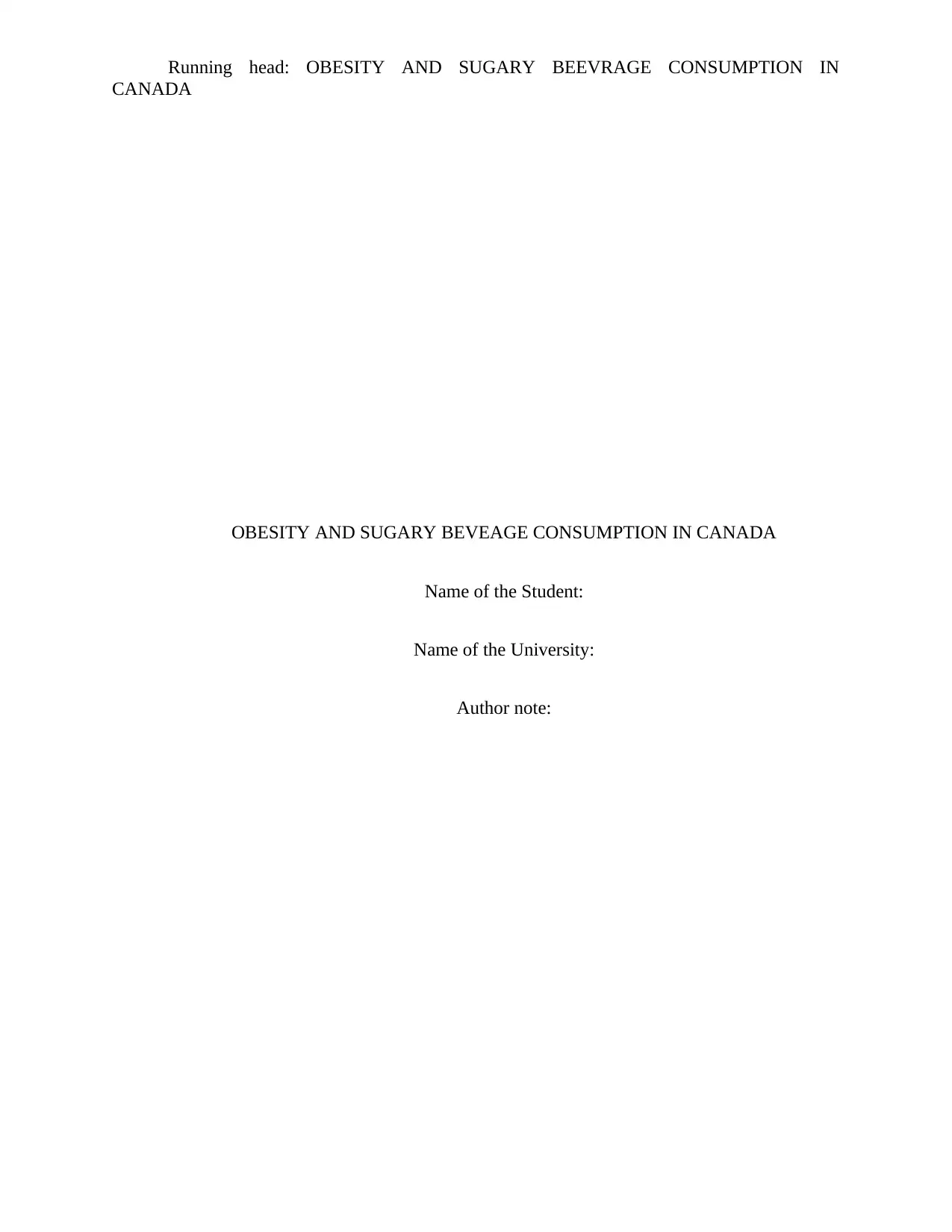
Running head: OBESITY AND SUGARY BEEVRAGE CONSUMPTION IN
CANADA
OBESITY AND SUGARY BEVEAGE CONSUMPTION IN CANADA
Name of the Student:
Name of the University:
Author note:
CANADA
OBESITY AND SUGARY BEVEAGE CONSUMPTION IN CANADA
Name of the Student:
Name of the University:
Author note:
Secure Best Marks with AI Grader
Need help grading? Try our AI Grader for instant feedback on your assignments.
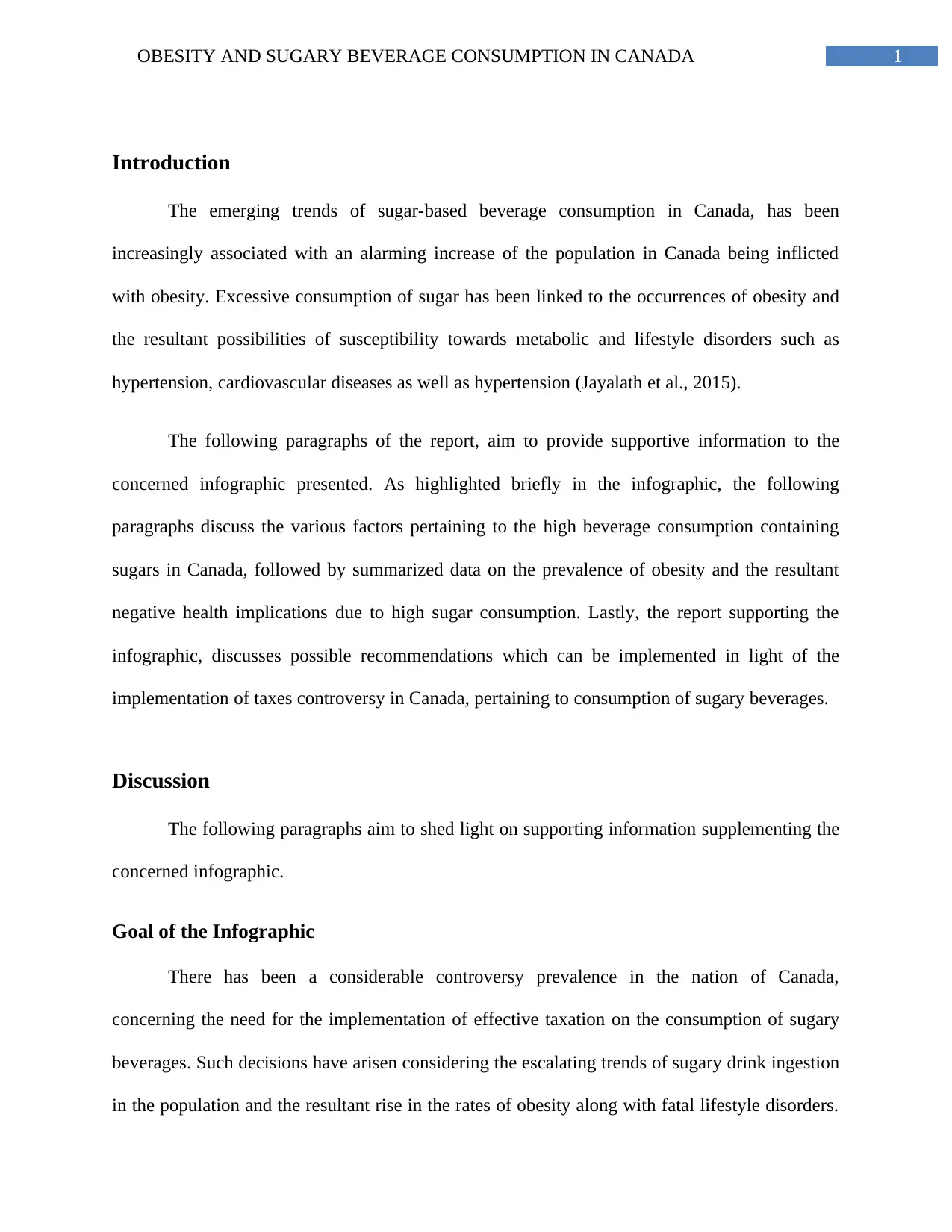
1OBESITY AND SUGARY BEVERAGE CONSUMPTION IN CANADA
Introduction
The emerging trends of sugar-based beverage consumption in Canada, has been
increasingly associated with an alarming increase of the population in Canada being inflicted
with obesity. Excessive consumption of sugar has been linked to the occurrences of obesity and
the resultant possibilities of susceptibility towards metabolic and lifestyle disorders such as
hypertension, cardiovascular diseases as well as hypertension (Jayalath et al., 2015).
The following paragraphs of the report, aim to provide supportive information to the
concerned infographic presented. As highlighted briefly in the infographic, the following
paragraphs discuss the various factors pertaining to the high beverage consumption containing
sugars in Canada, followed by summarized data on the prevalence of obesity and the resultant
negative health implications due to high sugar consumption. Lastly, the report supporting the
infographic, discusses possible recommendations which can be implemented in light of the
implementation of taxes controversy in Canada, pertaining to consumption of sugary beverages.
Discussion
The following paragraphs aim to shed light on supporting information supplementing the
concerned infographic.
Goal of the Infographic
There has been a considerable controversy prevalence in the nation of Canada,
concerning the need for the implementation of effective taxation on the consumption of sugary
beverages. Such decisions have arisen considering the escalating trends of sugary drink ingestion
in the population and the resultant rise in the rates of obesity along with fatal lifestyle disorders.
Introduction
The emerging trends of sugar-based beverage consumption in Canada, has been
increasingly associated with an alarming increase of the population in Canada being inflicted
with obesity. Excessive consumption of sugar has been linked to the occurrences of obesity and
the resultant possibilities of susceptibility towards metabolic and lifestyle disorders such as
hypertension, cardiovascular diseases as well as hypertension (Jayalath et al., 2015).
The following paragraphs of the report, aim to provide supportive information to the
concerned infographic presented. As highlighted briefly in the infographic, the following
paragraphs discuss the various factors pertaining to the high beverage consumption containing
sugars in Canada, followed by summarized data on the prevalence of obesity and the resultant
negative health implications due to high sugar consumption. Lastly, the report supporting the
infographic, discusses possible recommendations which can be implemented in light of the
implementation of taxes controversy in Canada, pertaining to consumption of sugary beverages.
Discussion
The following paragraphs aim to shed light on supporting information supplementing the
concerned infographic.
Goal of the Infographic
There has been a considerable controversy prevalence in the nation of Canada,
concerning the need for the implementation of effective taxation on the consumption of sugary
beverages. Such decisions have arisen considering the escalating trends of sugary drink ingestion
in the population and the resultant rise in the rates of obesity along with fatal lifestyle disorders.
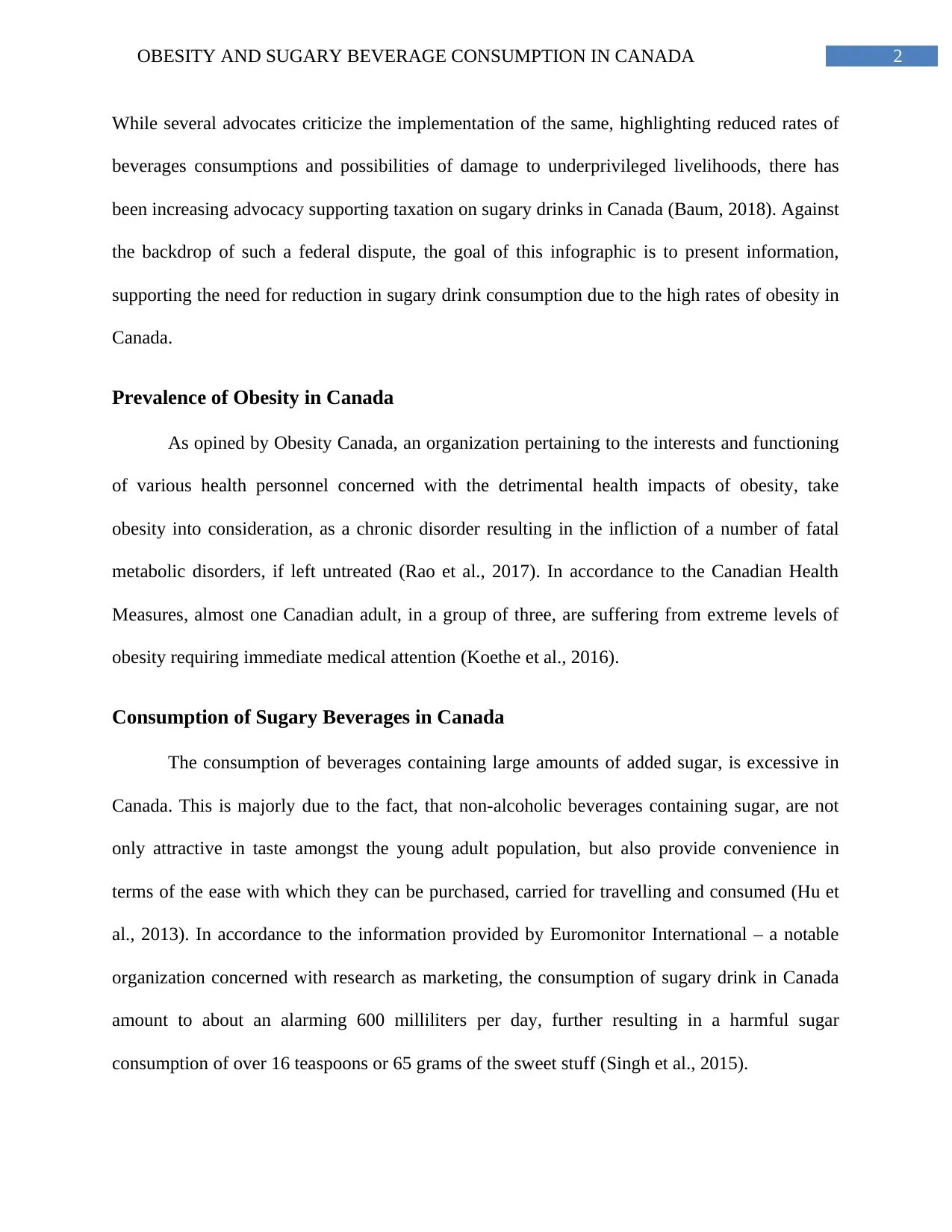
2OBESITY AND SUGARY BEVERAGE CONSUMPTION IN CANADA
While several advocates criticize the implementation of the same, highlighting reduced rates of
beverages consumptions and possibilities of damage to underprivileged livelihoods, there has
been increasing advocacy supporting taxation on sugary drinks in Canada (Baum, 2018). Against
the backdrop of such a federal dispute, the goal of this infographic is to present information,
supporting the need for reduction in sugary drink consumption due to the high rates of obesity in
Canada.
Prevalence of Obesity in Canada
As opined by Obesity Canada, an organization pertaining to the interests and functioning
of various health personnel concerned with the detrimental health impacts of obesity, take
obesity into consideration, as a chronic disorder resulting in the infliction of a number of fatal
metabolic disorders, if left untreated (Rao et al., 2017). In accordance to the Canadian Health
Measures, almost one Canadian adult, in a group of three, are suffering from extreme levels of
obesity requiring immediate medical attention (Koethe et al., 2016).
Consumption of Sugary Beverages in Canada
The consumption of beverages containing large amounts of added sugar, is excessive in
Canada. This is majorly due to the fact, that non-alcoholic beverages containing sugar, are not
only attractive in taste amongst the young adult population, but also provide convenience in
terms of the ease with which they can be purchased, carried for travelling and consumed (Hu et
al., 2013). In accordance to the information provided by Euromonitor International – a notable
organization concerned with research as marketing, the consumption of sugary drink in Canada
amount to about an alarming 600 milliliters per day, further resulting in a harmful sugar
consumption of over 16 teaspoons or 65 grams of the sweet stuff (Singh et al., 2015).
While several advocates criticize the implementation of the same, highlighting reduced rates of
beverages consumptions and possibilities of damage to underprivileged livelihoods, there has
been increasing advocacy supporting taxation on sugary drinks in Canada (Baum, 2018). Against
the backdrop of such a federal dispute, the goal of this infographic is to present information,
supporting the need for reduction in sugary drink consumption due to the high rates of obesity in
Canada.
Prevalence of Obesity in Canada
As opined by Obesity Canada, an organization pertaining to the interests and functioning
of various health personnel concerned with the detrimental health impacts of obesity, take
obesity into consideration, as a chronic disorder resulting in the infliction of a number of fatal
metabolic disorders, if left untreated (Rao et al., 2017). In accordance to the Canadian Health
Measures, almost one Canadian adult, in a group of three, are suffering from extreme levels of
obesity requiring immediate medical attention (Koethe et al., 2016).
Consumption of Sugary Beverages in Canada
The consumption of beverages containing large amounts of added sugar, is excessive in
Canada. This is majorly due to the fact, that non-alcoholic beverages containing sugar, are not
only attractive in taste amongst the young adult population, but also provide convenience in
terms of the ease with which they can be purchased, carried for travelling and consumed (Hu et
al., 2013). In accordance to the information provided by Euromonitor International – a notable
organization concerned with research as marketing, the consumption of sugary drink in Canada
amount to about an alarming 600 milliliters per day, further resulting in a harmful sugar
consumption of over 16 teaspoons or 65 grams of the sweet stuff (Singh et al., 2015).
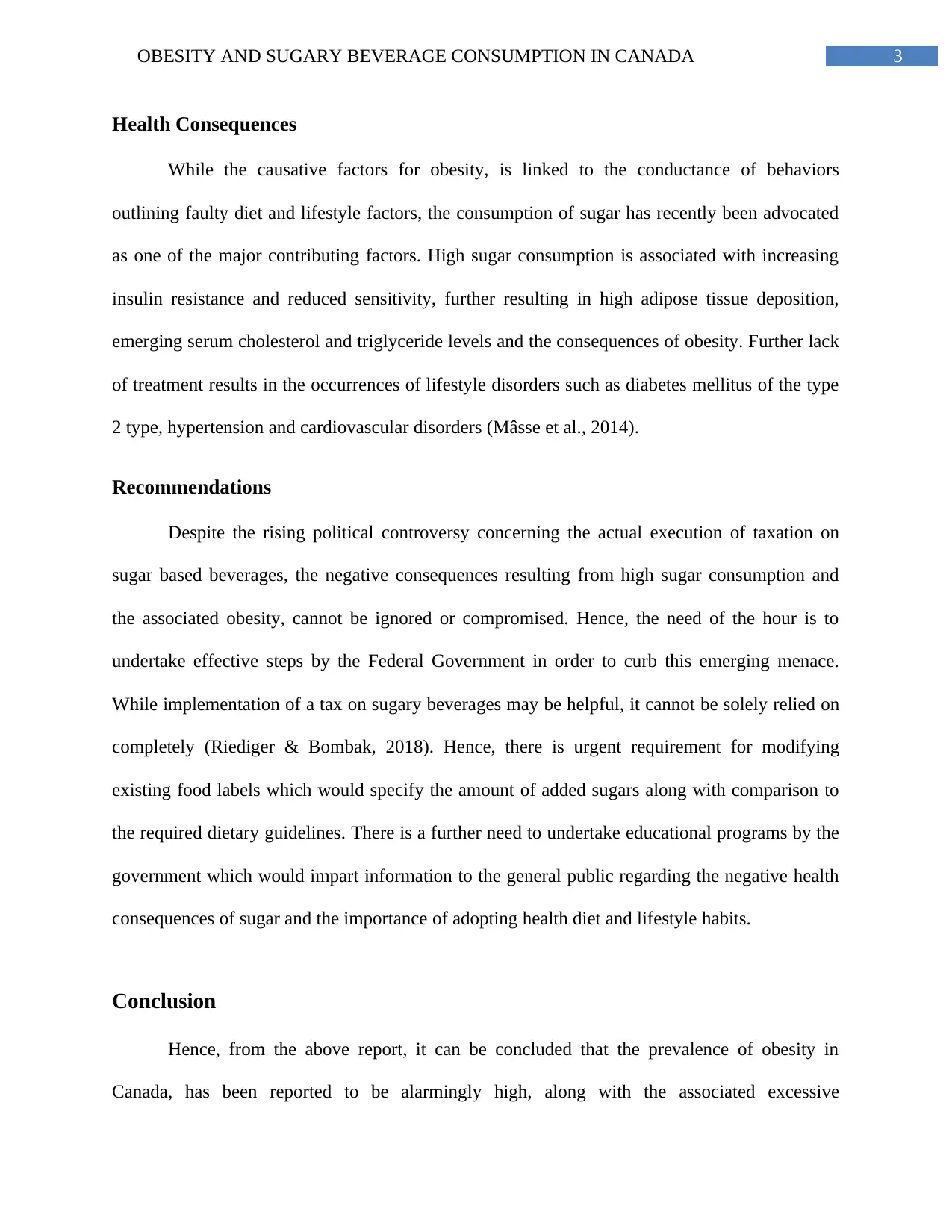
3OBESITY AND SUGARY BEVERAGE CONSUMPTION IN CANADA
Health Consequences
While the causative factors for obesity, is linked to the conductance of behaviors
outlining faulty diet and lifestyle factors, the consumption of sugar has recently been advocated
as one of the major contributing factors. High sugar consumption is associated with increasing
insulin resistance and reduced sensitivity, further resulting in high adipose tissue deposition,
emerging serum cholesterol and triglyceride levels and the consequences of obesity. Further lack
of treatment results in the occurrences of lifestyle disorders such as diabetes mellitus of the type
2 type, hypertension and cardiovascular disorders (Mâsse et al., 2014).
Recommendations
Despite the rising political controversy concerning the actual execution of taxation on
sugar based beverages, the negative consequences resulting from high sugar consumption and
the associated obesity, cannot be ignored or compromised. Hence, the need of the hour is to
undertake effective steps by the Federal Government in order to curb this emerging menace.
While implementation of a tax on sugary beverages may be helpful, it cannot be solely relied on
completely (Riediger & Bombak, 2018). Hence, there is urgent requirement for modifying
existing food labels which would specify the amount of added sugars along with comparison to
the required dietary guidelines. There is a further need to undertake educational programs by the
government which would impart information to the general public regarding the negative health
consequences of sugar and the importance of adopting health diet and lifestyle habits.
Conclusion
Hence, from the above report, it can be concluded that the prevalence of obesity in
Canada, has been reported to be alarmingly high, along with the associated excessive
Health Consequences
While the causative factors for obesity, is linked to the conductance of behaviors
outlining faulty diet and lifestyle factors, the consumption of sugar has recently been advocated
as one of the major contributing factors. High sugar consumption is associated with increasing
insulin resistance and reduced sensitivity, further resulting in high adipose tissue deposition,
emerging serum cholesterol and triglyceride levels and the consequences of obesity. Further lack
of treatment results in the occurrences of lifestyle disorders such as diabetes mellitus of the type
2 type, hypertension and cardiovascular disorders (Mâsse et al., 2014).
Recommendations
Despite the rising political controversy concerning the actual execution of taxation on
sugar based beverages, the negative consequences resulting from high sugar consumption and
the associated obesity, cannot be ignored or compromised. Hence, the need of the hour is to
undertake effective steps by the Federal Government in order to curb this emerging menace.
While implementation of a tax on sugary beverages may be helpful, it cannot be solely relied on
completely (Riediger & Bombak, 2018). Hence, there is urgent requirement for modifying
existing food labels which would specify the amount of added sugars along with comparison to
the required dietary guidelines. There is a further need to undertake educational programs by the
government which would impart information to the general public regarding the negative health
consequences of sugar and the importance of adopting health diet and lifestyle habits.
Conclusion
Hence, from the above report, it can be concluded that the prevalence of obesity in
Canada, has been reported to be alarmingly high, along with the associated excessive
Secure Best Marks with AI Grader
Need help grading? Try our AI Grader for instant feedback on your assignments.
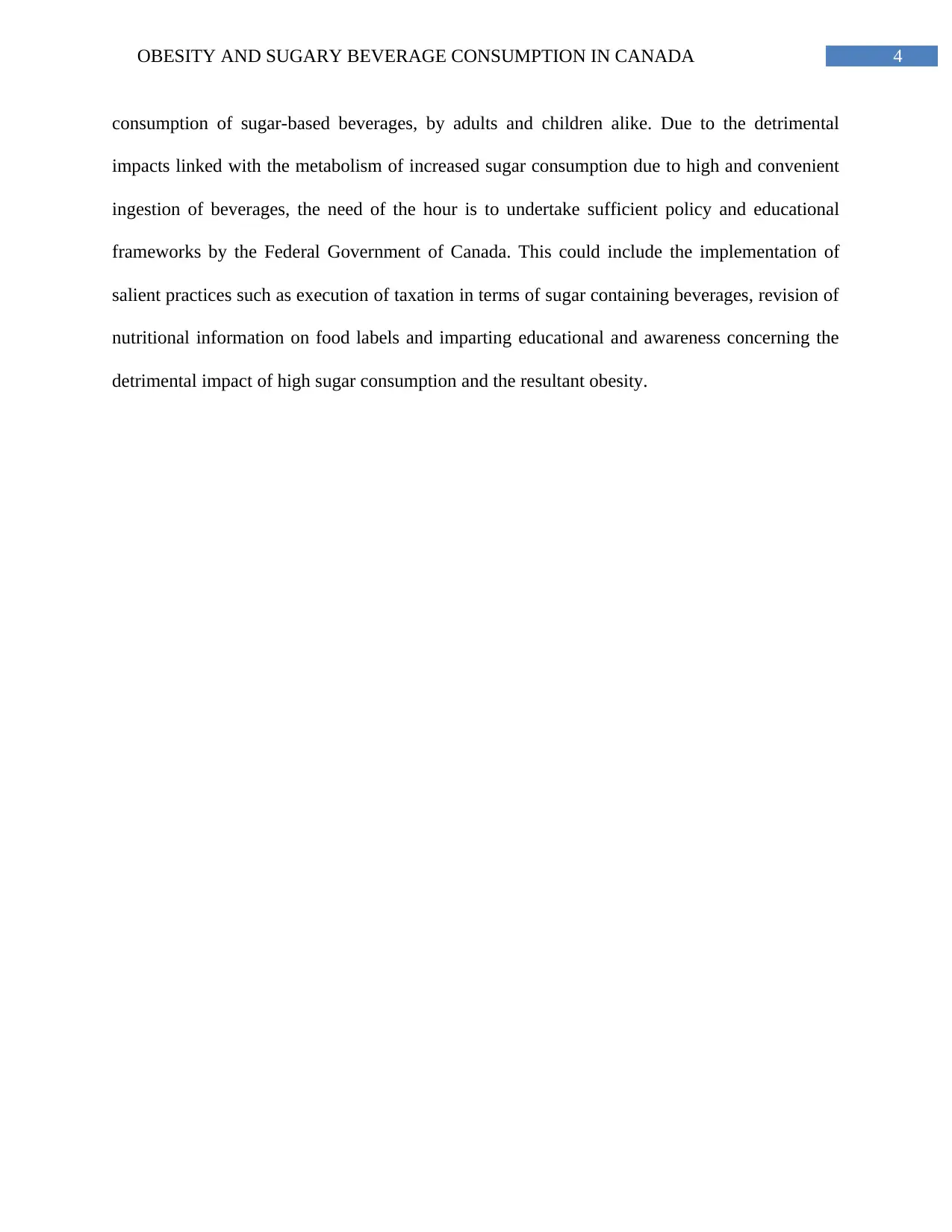
4OBESITY AND SUGARY BEVERAGE CONSUMPTION IN CANADA
consumption of sugar-based beverages, by adults and children alike. Due to the detrimental
impacts linked with the metabolism of increased sugar consumption due to high and convenient
ingestion of beverages, the need of the hour is to undertake sufficient policy and educational
frameworks by the Federal Government of Canada. This could include the implementation of
salient practices such as execution of taxation in terms of sugar containing beverages, revision of
nutritional information on food labels and imparting educational and awareness concerning the
detrimental impact of high sugar consumption and the resultant obesity.
consumption of sugar-based beverages, by adults and children alike. Due to the detrimental
impacts linked with the metabolism of increased sugar consumption due to high and convenient
ingestion of beverages, the need of the hour is to undertake sufficient policy and educational
frameworks by the Federal Government of Canada. This could include the implementation of
salient practices such as execution of taxation in terms of sugar containing beverages, revision of
nutritional information on food labels and imparting educational and awareness concerning the
detrimental impact of high sugar consumption and the resultant obesity.
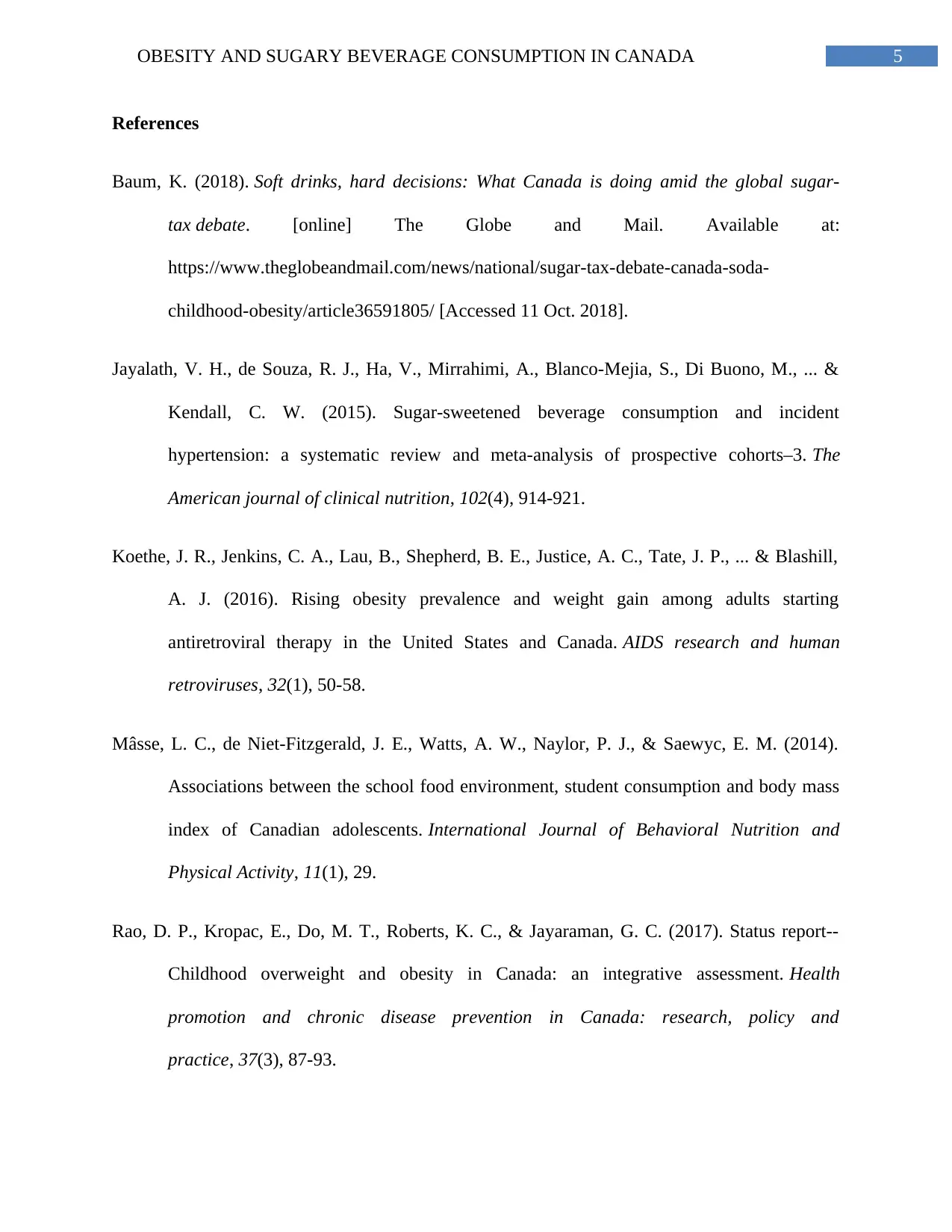
5OBESITY AND SUGARY BEVERAGE CONSUMPTION IN CANADA
References
Baum, K. (2018). Soft drinks, hard decisions: What Canada is doing amid the global sugar-
tax debate. [online] The Globe and Mail. Available at:
https://www.theglobeandmail.com/news/national/sugar-tax-debate-canada-soda-
childhood-obesity/article36591805/ [Accessed 11 Oct. 2018].
Jayalath, V. H., de Souza, R. J., Ha, V., Mirrahimi, A., Blanco-Mejia, S., Di Buono, M., ... &
Kendall, C. W. (2015). Sugar-sweetened beverage consumption and incident
hypertension: a systematic review and meta-analysis of prospective cohorts–3. The
American journal of clinical nutrition, 102(4), 914-921.
Koethe, J. R., Jenkins, C. A., Lau, B., Shepherd, B. E., Justice, A. C., Tate, J. P., ... & Blashill,
A. J. (2016). Rising obesity prevalence and weight gain among adults starting
antiretroviral therapy in the United States and Canada. AIDS research and human
retroviruses, 32(1), 50-58.
Mâsse, L. C., de Niet-Fitzgerald, J. E., Watts, A. W., Naylor, P. J., & Saewyc, E. M. (2014).
Associations between the school food environment, student consumption and body mass
index of Canadian adolescents. International Journal of Behavioral Nutrition and
Physical Activity, 11(1), 29.
Rao, D. P., Kropac, E., Do, M. T., Roberts, K. C., & Jayaraman, G. C. (2017). Status report--
Childhood overweight and obesity in Canada: an integrative assessment. Health
promotion and chronic disease prevention in Canada: research, policy and
practice, 37(3), 87-93.
References
Baum, K. (2018). Soft drinks, hard decisions: What Canada is doing amid the global sugar-
tax debate. [online] The Globe and Mail. Available at:
https://www.theglobeandmail.com/news/national/sugar-tax-debate-canada-soda-
childhood-obesity/article36591805/ [Accessed 11 Oct. 2018].
Jayalath, V. H., de Souza, R. J., Ha, V., Mirrahimi, A., Blanco-Mejia, S., Di Buono, M., ... &
Kendall, C. W. (2015). Sugar-sweetened beverage consumption and incident
hypertension: a systematic review and meta-analysis of prospective cohorts–3. The
American journal of clinical nutrition, 102(4), 914-921.
Koethe, J. R., Jenkins, C. A., Lau, B., Shepherd, B. E., Justice, A. C., Tate, J. P., ... & Blashill,
A. J. (2016). Rising obesity prevalence and weight gain among adults starting
antiretroviral therapy in the United States and Canada. AIDS research and human
retroviruses, 32(1), 50-58.
Mâsse, L. C., de Niet-Fitzgerald, J. E., Watts, A. W., Naylor, P. J., & Saewyc, E. M. (2014).
Associations between the school food environment, student consumption and body mass
index of Canadian adolescents. International Journal of Behavioral Nutrition and
Physical Activity, 11(1), 29.
Rao, D. P., Kropac, E., Do, M. T., Roberts, K. C., & Jayaraman, G. C. (2017). Status report--
Childhood overweight and obesity in Canada: an integrative assessment. Health
promotion and chronic disease prevention in Canada: research, policy and
practice, 37(3), 87-93.
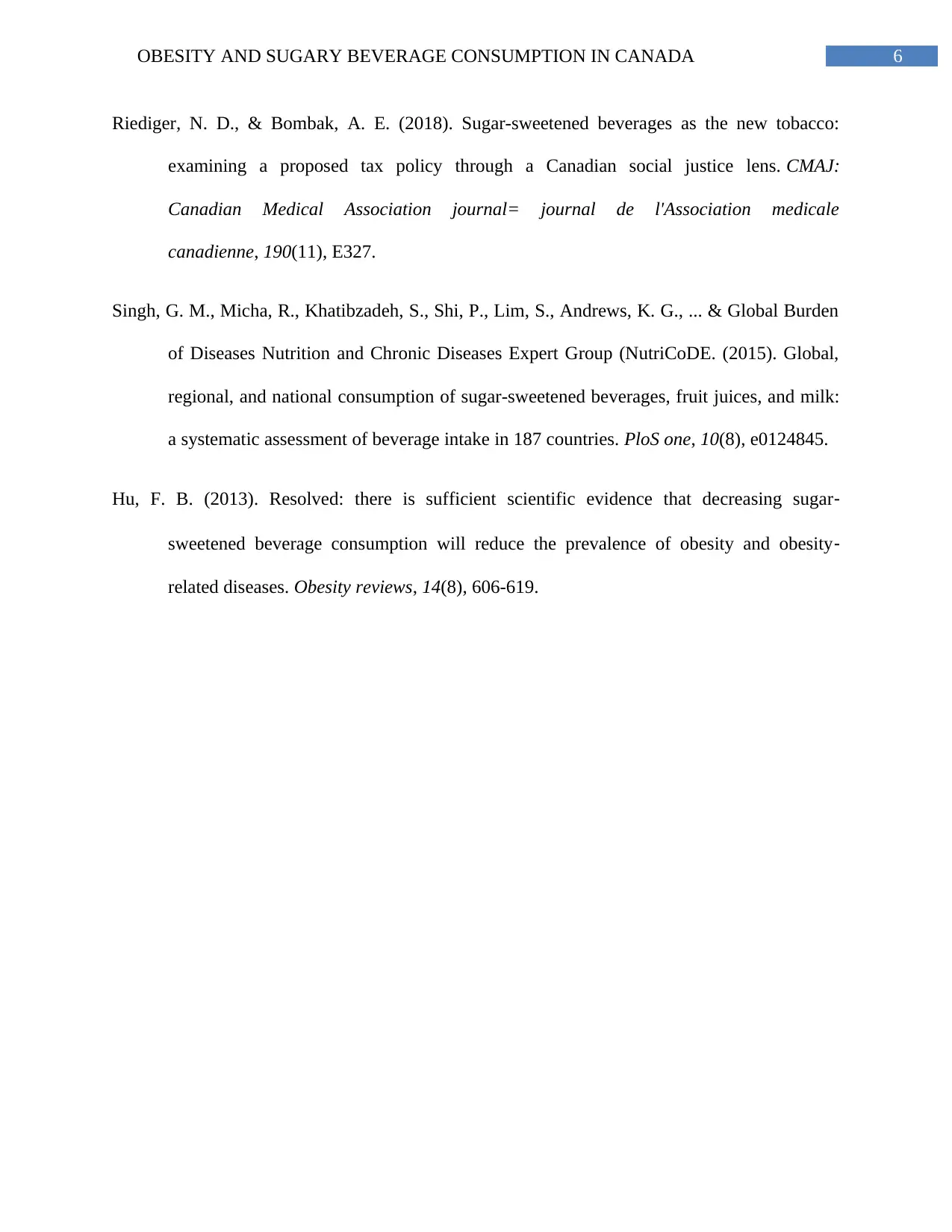
6OBESITY AND SUGARY BEVERAGE CONSUMPTION IN CANADA
Riediger, N. D., & Bombak, A. E. (2018). Sugar-sweetened beverages as the new tobacco:
examining a proposed tax policy through a Canadian social justice lens. CMAJ:
Canadian Medical Association journal= journal de l'Association medicale
canadienne, 190(11), E327.
Singh, G. M., Micha, R., Khatibzadeh, S., Shi, P., Lim, S., Andrews, K. G., ... & Global Burden
of Diseases Nutrition and Chronic Diseases Expert Group (NutriCoDE. (2015). Global,
regional, and national consumption of sugar-sweetened beverages, fruit juices, and milk:
a systematic assessment of beverage intake in 187 countries. PloS one, 10(8), e0124845.
Hu, F. B. (2013). Resolved: there is sufficient scientific evidence that decreasing sugar‐
sweetened beverage consumption will reduce the prevalence of obesity and obesity‐
related diseases. Obesity reviews, 14(8), 606-619.
Riediger, N. D., & Bombak, A. E. (2018). Sugar-sweetened beverages as the new tobacco:
examining a proposed tax policy through a Canadian social justice lens. CMAJ:
Canadian Medical Association journal= journal de l'Association medicale
canadienne, 190(11), E327.
Singh, G. M., Micha, R., Khatibzadeh, S., Shi, P., Lim, S., Andrews, K. G., ... & Global Burden
of Diseases Nutrition and Chronic Diseases Expert Group (NutriCoDE. (2015). Global,
regional, and national consumption of sugar-sweetened beverages, fruit juices, and milk:
a systematic assessment of beverage intake in 187 countries. PloS one, 10(8), e0124845.
Hu, F. B. (2013). Resolved: there is sufficient scientific evidence that decreasing sugar‐
sweetened beverage consumption will reduce the prevalence of obesity and obesity‐
related diseases. Obesity reviews, 14(8), 606-619.
1 out of 7
Related Documents
Your All-in-One AI-Powered Toolkit for Academic Success.
+13062052269
info@desklib.com
Available 24*7 on WhatsApp / Email
![[object Object]](/_next/static/media/star-bottom.7253800d.svg)
Unlock your academic potential
© 2024 | Zucol Services PVT LTD | All rights reserved.



